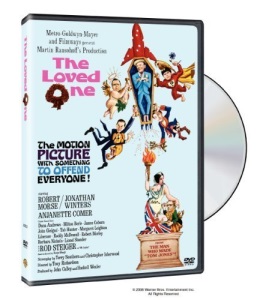The Loved One (1965)
December 28, 2022 11:26 AM - Subscribe
Newly arrived in Hollywood from England, Dennis Barlow (Robert Morse) finds he has to arrange his uncle's interment at the highly-organised and very profitable Whispering Glades funeral parlour. His fancy is caught by one of their cosmeticians, Aimee Thanatogenos (Anjanette Comer). But he has three problems - the strict rules of owner Blessed Reverand Glenworthy (Jonathan Winters), the rivalry of embalmer Mr Joyboy (Rod Steiger), and the shame of now working himself at The Happy Hunting Ground pets' memorial home.
This is a bonkers crazy movie with an amazing cast, which also includes Tab Hunter, Robert Morley, Milton Berle, Paul Williams, Liberace, and many others. Rod Steiger out-Liberaces Liberace, which is something. Disastrously fails the Bechdel test.
Based on the novella of the same name by Evelyn Waugh, apparently the author hated the movie, despite never having seen it (he died shortly after its opening). The studio execs, who were sharply lampooned in it, also hated it. Forest Lawn cemetery, which is at the heart of its satire, sought to enjoin its release, but obviously failed.
It kind of peters out at the end—I have a feeling that a couple of important scenes were cut—but it's a fun ride all the same.
This is a bonkers crazy movie with an amazing cast, which also includes Tab Hunter, Robert Morley, Milton Berle, Paul Williams, Liberace, and many others. Rod Steiger out-Liberaces Liberace, which is something. Disastrously fails the Bechdel test.
Based on the novella of the same name by Evelyn Waugh, apparently the author hated the movie, despite never having seen it (he died shortly after its opening). The studio execs, who were sharply lampooned in it, also hated it. Forest Lawn cemetery, which is at the heart of its satire, sought to enjoin its release, but obviously failed.
It kind of peters out at the end—I have a feeling that a couple of important scenes were cut—but it's a fun ride all the same.
apparently the author hated the movie, despite never having seen it
When the film was made, Waugh was at a point in his life when he hated everything. Absolutely everything.
The book was written in 1948, when he was still capable of enjoying himself. Considering that he avoided taking meetings about Brideshead Revisited so that he could spend his time researching Forest Lawn, I would be willing to be that the side characters, including Mr Joyboy, had real life counterparts. Dennis, on the other hand, has a lot of Basil Seal in him.
posted by betweenthebars at 1:48 PM on December 29, 2022 [1 favorite]
When the film was made, Waugh was at a point in his life when he hated everything. Absolutely everything.
The book was written in 1948, when he was still capable of enjoying himself. Considering that he avoided taking meetings about Brideshead Revisited so that he could spend his time researching Forest Lawn, I would be willing to be that the side characters, including Mr Joyboy, had real life counterparts. Dennis, on the other hand, has a lot of Basil Seal in him.
posted by betweenthebars at 1:48 PM on December 29, 2022 [1 favorite]
You are not logged in, either login or create an account to post comments

The director, Tony Richardson, had built his reputation on kitchen sink dramas before breaking through with Tom Jones in 1963, so there's a general air of sardonic English eyebrow-raising (I've read a few comic novels by English authors aghast at the United States). As an English person, I'm not so sure I find that sort of thing as enjoyable as I once did - it seems a bit smug and judge not lest you be judged, that sort of thing. The target of the raised eyebrow was certainly deserving, though, as I'd hope Caitlyn Doughty would agree.
Mr Joyboy is a fascinating case study in a particular strain of open homophobia that has largely been superseded, I think. When I was young, I did stumble across references in U.S. culture of the fifties to the problem of Mother's Boys, and Joyboy is an example of that.
Although it's always a pleasure to see Robert Morse in anything, the level of artifice in his performance pushes the film into a rather broader territory than I'd like (though it's not exactly a subtle book, to begin with). I always feel Morse is winking at the audience, and while that's lovely in something like How to Get Ahead in Business..., I feel it slightly blunts the satire here. I do wonder who Richardson might have cast from his kitchen sink days - Tom Courtenay would have been perfect, and it would have made for a completely different film, even if you didn't change anything else. The other theme of the novel - the self-conscious hyper-Englishness of the English in Hollywood was, in some ways, more interesting to me.
Interesting to compare the ending to the much darker ending of the book. Waugh would have had no time for that sentimentality.
That said, I read the book over forty years ago, so I might be remembering it slightly askew.
posted by Grangousier at 3:51 AM on December 29, 2022